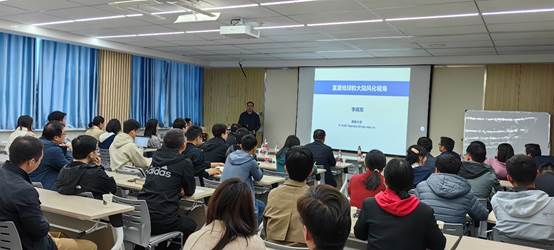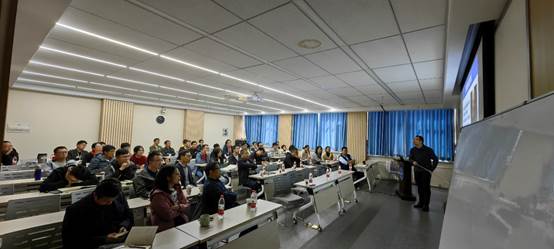On October 9, 2023, at the invitation of Lanzhou University's College of Earth and Environmental Sciences and the Key Laboratory of Western Environmental Education of the Ministry of Education, Professor Gaojun Li from the School of Earth Sciences and Engineering at Nanjing University delivered an academic lecture titled "A Perspective on Habitable Earth: Continental Weathering." The lecture was chaired by Professor Junsheng Nie and held in Meeting Room 502, Qilian Hall, with nearly 50 faculty and students in attendance.

During the lecture, Professor Li Gaojun began by discussing the five key elements required for a habitable planet. These elements include a stable spatial environment, a long-term rarefied atmosphere, the presence of water, a habitable climate, and the existence of oxygen. Professor Li then delved into the challenges and advancements in understanding the geological air conditioning mechanisms driven by continental weathering. He explained that continental weathering is the process through which surface rocks and minerals decompose under the influence of water, the atmosphere, and biological processes. This process plays a pivotal role in the interaction of Earth's spheres, disrupting rock and soil stability, forming soil parent material, releasing nutrients, and enriching mineral elements.
In the concluding part of his lecture, Professor Li Gaojun presented the mechanisms and evidence of continental weathering driving atmospheric oxygenation. He highlighted three main points of understanding: shale big data suggests that phosphorus flux may be controlled by continental erosion in response to orogenic movements, an increase in pO2/pCO2 changes the redox properties of the weathering front zone and promotes phosphorus release, and an increase in pO2/pCO2 enhances the efficiency of granite weathering, potentially triggering a Snowball Earth scenario.

Professor Li Gaojun's lecture was highly comprehensive and insightful, expanding the academic horizons of faculty and students. Following the lecture, Professor Li Gaojun engaged in extensive discussions with other professors and students, exploring various scientific questions such as the hypothesis of orogenic uplift-driven ice age climate, the relationship between Earth's habitable elements, habitable zones, and the greenhouse effect, as well as the mechanisms of weathering-driven climate feedback models. Professor Li Gaojun provided thoughtful and focused responses to every question posed by faculty and students, leaving a profound impression on all who attended.
About the Expert:
Professor Gaojun Li, born in 1983 in Luxian, Sichuan, is a professor and doctoral supervisor in the School of Earth Sciences and Engineering at Nanjing University. He has undertaken projects such as the National Natural Science Foundation's National Distinguished Young Scholar Fund (Geochemistry) and the Excellent Young Scientist Fund (Quaternary Geology). He has received numerous accolades, including the National Excellent Doctoral Dissertation Award, the Liu Dongsheng Young Earth Scientist Award, the Hou Defeng Young Earth Scientist Award, and the title of Newton Advanced Fellow from the Royal Society in the United Kingdom. Professor Li focuses on the development of innovative methods in geochemistry and their application. Using geochemical big data and global biogeochemical cycle models, he studies the formation and evolution of habitable elements, such as water, soil, and air, from the perspective of chemical weathering. He has conducted a series of studies on topics including Asian dust sources, quantitative paleoprecipitation indicators in loess sediments, the tectonic uplift-driven ice age climate hypothesis, and the formation of ancient habitable atmospheric environments. As the first or corresponding author, he has published 34 SCI papers, including 24 in the Nature Index, and his papers have been cited nearly 2,000 times.